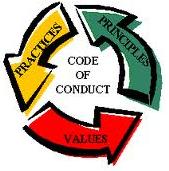'

ScreenRetriever’s Online Code of Conduct and Safety Rules
Online Safety Rules and Code of Conduct Contract
Important Fact: The internet is not private and what you post will be in cyberspace forever!
Your parents teach you manners in the real world. You need to apply these same manners and “code of conduct” online too! Be respectful and courteous online. Behave online the same way your parents expect you to behave offline.
- When you post comments or images online you are creating your personal online reputation and digital footprint. Protect your personal reputation. What image do you want to present to others? Your reputation online will be there forever. What you post can affect your admission to college, obtaining a scholarship or future employment.
- Your parents will be checking-in on your computer use to make sure that you are following and learning internet safety rules and adhering to a “code of conduct” because they care about you and your future. If they see that you are learning and adhering to good online behavior practices, they will check-in less as you get older. Your parents are there to guide you.
- Tell your parents or a trusted adult if you get into a “sticky” situation, or when something just doesn’t feel right.
Computer/Mobile Device Behavior and Safety Rules:

When kids go online, we need to teach them to think before they click!
- Don’t lie about your age to go on a website, social networking site, chatroom or app.
- Make sure you have the strongest privacy settings on Facebook and other social networking accounts.
- Protect your computer password(s). Do not give them out to friends.
- Use strong passwords that include numbers and characters.
- Do not give out personal identifying info such as name, age, address,telephone number, school name. Be careful about posting pictures with the name of your school or other identifying information that can be pieced together to identify you. Following this rule will help protect you against identity theft and predators.
- Beware of online scams that try to trick you into giving personal information.
- Do not give out personal identifying info of parents or friends.
- Remember people on the Internet aren’t always who they say they are, they aren’t always telling the truth. Online predators may pretend to be someone they’re not.
- Don’t friend someone online that you don’t know offline! Make sure that you know everyone on your “buddy/friend” list.
- Be wary of someone asking for personal information, pictures, or a meeting.
- Don’t use sexually suggestive screen names that may attract attention from a predator.
- Don’t ever meet anyone in person that you met online without talking to your parents.
- Don’t go into “chat rooms” with people you don’t know.
- Don’t post on line any picture or comment that you don’t want the world to see forever. If you think it might be inappropriate, don’t post it. What you post today can affect your future, like admission to college and later a job.
- Don’t post or send naked pictures of yourself online to “a friend.” This is sexting and it’s illegal!
- Ask yourself if your parents would approve of what you’re doing online, and what you’re posting? Would you want your grandmother to see that picture you posted?
- Don’t post anything hurtful online. Don’t spread rumors, or make fun of someone online. This is cyberbullying! Be courteous and respectful online.
- Don’t post anything anonymously that you wouldn’t say to someone’s face!
- If someone cyberbullies you online get some help from an adult, because this may be more than you can handle on your own.
- Don’t respond or engage with a cyberbully!
- If you have been cyberbullied online, save a video, or screenshot (ScreenRetriever) of the incident to show your parents, to avoid the “he said, she said” problem. However, don’t comment back and don’t forward it on.
- If you’re feeling very emotional and reactive stay off the computer till you’ve calmed down.
- Check to see what your friends are posting online about you. If it’s not acceptable ask them to delete it. Remember what your friends post, can go to their friends, and then their friends…
- Recheck your information from the Internet, is it true?
- Do not download or install software before checking with your parents. They could contain a virus.
- Don’t buy “apps” without talking to your parents.
- Don’t order anything online even if it’s free without checking with parents.
- Don’t open an email or text from a stranger or phone number you don’t recognize. It may contain a virus.
- When you’re supposed to be doing homework, don’t IM, go on Facebook or play games. Get your work done, do a good job and then chat with friends or play games. Multitasking is a myth. For every task that you add, your performance gets worse!
- Don’t go on the computer when you should be sleeping. You need sleep to learn and stay healthy!
- Don’t stay on the computer for hours. Do other things too… Remember there is a whole world out there for you to explore!
- If you find you can’t stop yourself from going online for hours and hours, you may have an internet addiction problem and may need to ask for help from your parents.
- Don’t swear on line.
Do your best to follow these rules because it’s your responsibility to learn how to use the computer, mobile devices and Internet – Safely, Responsibly and Appropriately.
I have read these guidelines and will do my best to follow these rules and “code of conduct” online.
Signed ___________________________________________________________________




